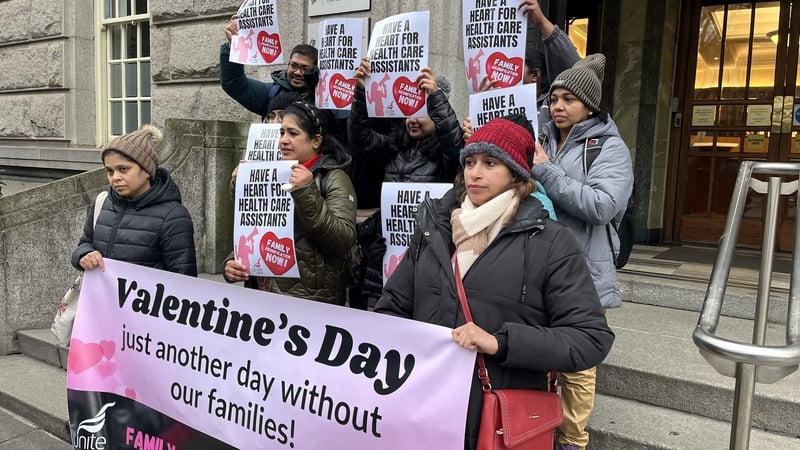Migrant healthcare assistants (HCAs) held a protest outside the Department of Enterprise, Trade and Employment calling for urgent reform of work permit earnings rules which they say are prolonging separation from their families.
Under the current system, many migrant HCAs earn below the income threshold which would allow them to apply to bring family members to Ireland.
Shiji Moncy is a member of the Unite trade union and works as a HCA in Dublin.
She has been separated from her family for the past three years.
“Our role as healthcare assistants is physically and mentally exhausting, and at the end of each shift we return to an empty home,” Ms Moncy said.
“Our message to the public is simple: we look after your parents and grandparents as though they were ours – but we only get snatched video link moments with our own families.
“This Valentine’s Day we are asking the Government to have a heart and let us bring our families to live with us,” she added.
Workers have also highlighted an anomaly which sees migrant HCAs on contracts pre-dating 1 January earning less than those on newer contracts.
The Government-mandated minimum salary increased in January for HCAs on new contracts.
However, according to Unite, a lack of retrospection means migrant HCAs on existing contracts were excluded from last month’s increase, leaving them on minimum salaries of just over €27,000.
This means that HCAs on existing contracts are not only earning below the family reunification threshold, but are also being paid less than new entrants performing the same role.
“Migrant HCAs look after some of the most vulnerable members of our community and the care sector would stop functioning without them,” said Unite’s Irish secretary Susan Fitzgerald.
“Compared to all other categories of workers in Ireland under the work permit system, HCAs are the lowest of the low in pay terms – even after the recent increase for new entrants,” she added.
“It’s long past time to start paying HCAs a decent wage, stop discriminating between workers, and stop separating workers from their families,” Ms Fitzgerald said.
In a statement, the Department of Enterprise, Trade and Employment said it would continue to engage with the Department of Justice and the Department of Health on the matter, “to ensure an equitable and sustainable whole-of-government approach to family reunification for this crucial cohort of workers”.




